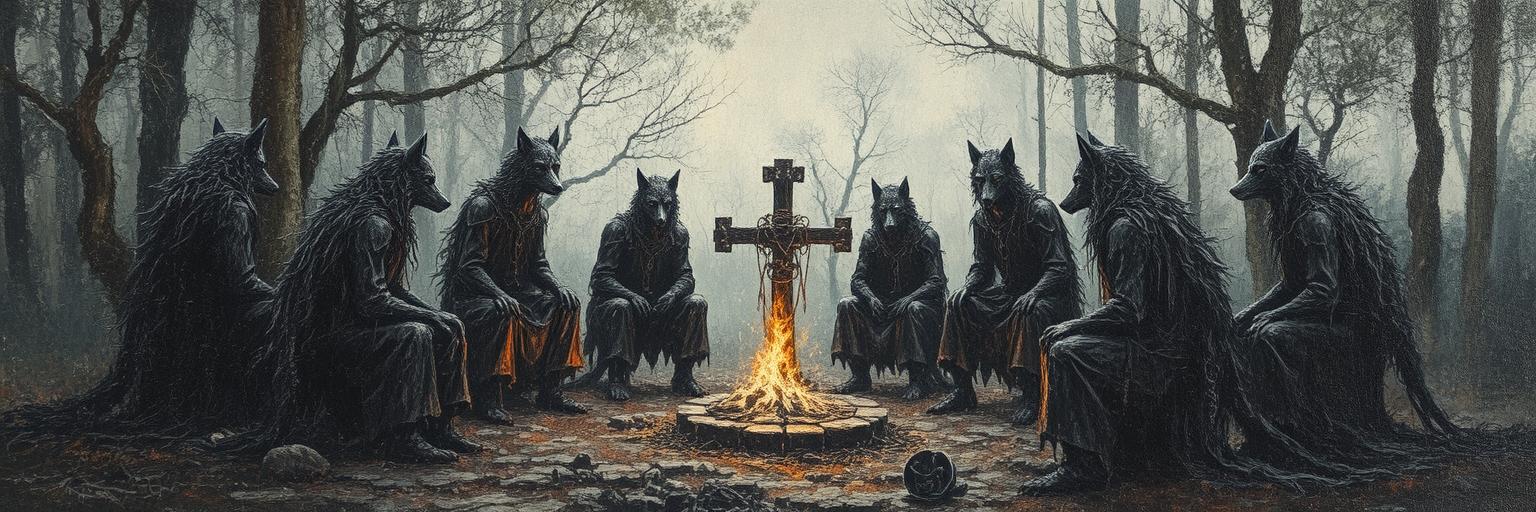The Old Blood Society
Our bloodlines are ancient. Devotion to their purity is an act of worship.
There are no clear, hard, and fast rules about werewolf mating. For centuries, werewolves have mated with their own kind, with natural wolves, and with natural humans. The offspring of these pairings are nearly always born as werewolves, although they often have weakened immune systems and lack the enhanced healing so common in werewolf bloodlines. These "hybrid" offspring are one of the chief reasons the Old Blood Society was formed in the wake of World War II.
Everything's changing too quickly now. If there's one thing that ought to stay the same, it's our blood. Outsiders can't be allowed to interfere with an unbroken line.
The Old Blood society opposes the integration of foundlings, human-werewolf or wolf-werewolf relationships, and any contamination by human culture or technology. Its members believed that the best mated pairs are arranged by a skilled matchmaker who understands both bloodlines and the strengths of those bloodlines so they can come together to create something stronger. The current system is, they say, draining their power and making their bloodlines weak.
Controversial Principles of the Old Blood Society
- Only "pure-blood" werewolves should hold leadership positions
- Bitten werewolves are "lesser" and shouldn't be allowed to mate
- Human technology (like reliance on railroads) is weakening werewolf nature
- Veterans returning from war are "tainted" by human military culture
- Each territory should be completely isolated from human society
Society Views on Foundlings
The bloodline of a foundling is entirely unknown, and therefore, the society believes that foundlings should not be allowed to mate. In fact, some extremists believe they should either be left to the elements or destroyed before they have the opportunity to create progeny -- whether bitten or born. Certain extremists have made a point of hunting down sigma werewolves and destroying them, making the society the second greatest threat to packless werewolves after human hunters.
Why Membership is Growing
- Technology is changing rapidly in the post-war period, and it scares a lot of werewolf traditionalists
- Some wolves believe that their traditions are being lost and are best preserved with pure blood
- Human exposure is becoming more and more likely, and strong wolves with strong powers survive
- Economic hardships in some parts of North America make scapegoating appealing
- Combat veterans are returning from war with "new ideas," and the idea of change frightens some wolves
Support & Opposition
Veiltenders: The community of Veiltenders is split on the subject of the Old Blood Society. Many believe that the ancestors are increasingly unsettled because they are watching their bloodlines become diluted due to interbreeding with non-magical species. Some wolves have even been known to breed with other magical species, and most veiltenders believe the results of these unions are an atrocity. On the other hand, some veiltenders believe societies like the Old Blood Society weaken the link to the ancestors. Nobody is sure one way or another, and the community is divided.
Foundling Packs: Seemingly needed now more than ever, the Foundling Packs oppose the Old Blood Society. Loudly. These packs are devoted to helping lost wolves find their way home -- or at least to a new pack. Redemption is one of the most important themes among these packs, while the Old Blood Society is hunting down and even killing the very people the Foundling Packs seek to help and serve. This may be the greatest feud happening across North America for the werewolves right now.
Rootwalkers: More even than their Veiltending counterparts, Rootwalkers are aware of the Root, and they understand how the ancestral tree works better than most. While the Veiltenders have a direct line to the ancestors themselves, the Rootwalkers may observe which branches of the Root have decayed or fallen away. Since the formation of the Old Blood Society, Rootwalkers note that more branches are dying, indicating that the names of ancestor wolves are being forgotten. They question whether this could be because those ancestors were not "pure blood" and if the Society isn't burning them out of the Root -- which could clearly be dangerous.



Comments